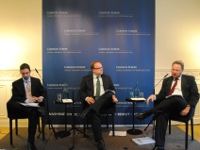Registration
You will receive an email confirming your registration.
IMGXYZ3193IMGZYXDiverging opinions within the European Union on issues such as ensuring energy supply security and fostering a cohesive internal energy market have made the task of forging a common EU energy policy almost insurmountable. The European Commission’s newly released White Paper, entitled The EU Energy Policy: Engaging with Partners Beyond Our Borders, outlines a strategy that calls for an increased, consolidated role for Brussels to resolve these tensions.
Michael Koehler, Head of Cabinet of Energy Commissioner Günther H. Oettinger, examined the Commission’s new strategy, while Carnegie’s Adnan Vatansever provided an informed response, drawing on extensive experience and current research on gas markets in the Eurasian region. Carnegie Europe’s Director Jan Techau moderated.
The White Paper
- A New Direction: The newly released white paper highlights the challenges faced by the EU in shaping a new direction for European energy security, Koehler said. The paper summarizes needs that have been identified through a thorough consultation process, he added.
- A Timely Communication: While the paper presents the EU’s viewpoint in addressing the issues, a sustainable solution needs to involve everyone in the energy valve chain, including importers, exporters, and transition countries, Vatansever warned.
A Changing EU Energy Policy
- Diversification of Resources: Europe has a limited supply of natural energy and raw materials and must diversify its energy sources so it is not completely dependent on one source, Koehler said. Techau added that foreign policy concerns can affect European energy needs, pointing out that such diversification is seen by Russia as an existential threat, since Russia is the EU’s main gas supply.
- Game Changers: The idea of a Single European Market, the EU’s climate change policy, and Europe’s current dependence on outside sources for natural gas are both big game changers in an evolving EU energy policy, Koehler said. He added that this policy was a major priority of the EU Polish presidency.
- Greater Unity: Vatansever added that the EU needs a stronger, more united voice to move forward on energy issues.
Ensuring a Continuous Energy Supply
- Short-Term Disruptions: There needs to be a mechanism in place to deal with short-term disruptions, so that energy sources are not cut off, Vatansever said
- Long-term Investment: Ensuring long-term investment is also needed, as insufficient investment in gas resources today could result in higher prices tomorrow, affecting Europe’s energy security, Vatansever added.
Lack of Efficient Energy Markets
- Transparency and Accountability: Energy markets need to function efficiently and operate with transparency and accountability, Vatansever said. Politics should not play a part in the market; The lack of a clear criteria on Moscow’s part in setting gas contract prices, on the one hand, and mixed signals by Europe with regard to Russian investments on the other, have enforced the belief that politics remains a major part of energy relations, Vatansever noted.
- Inefficiency: Vatansever said that the lack of a competitively structured Russian gas market has contributed to the problem to the lack of efficiently-functioning gas flow between the two sides of the trade.
